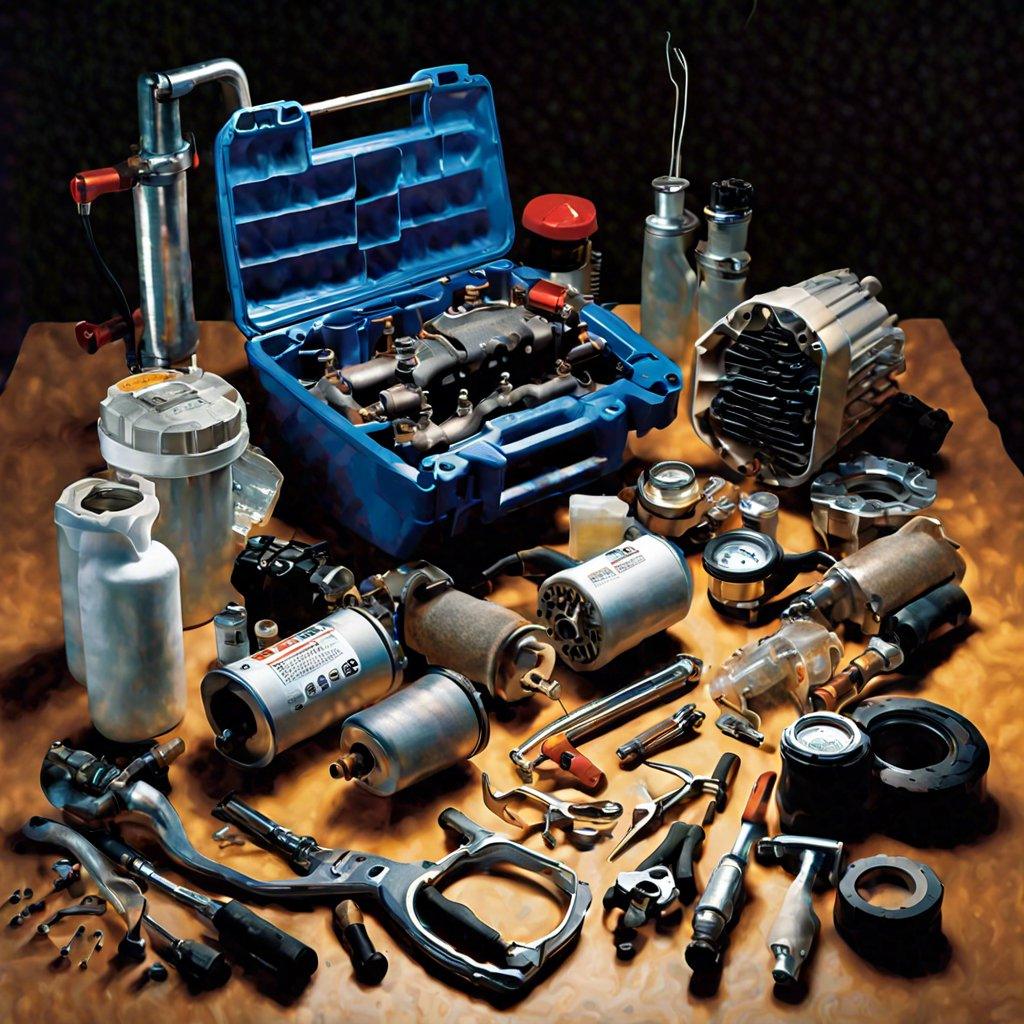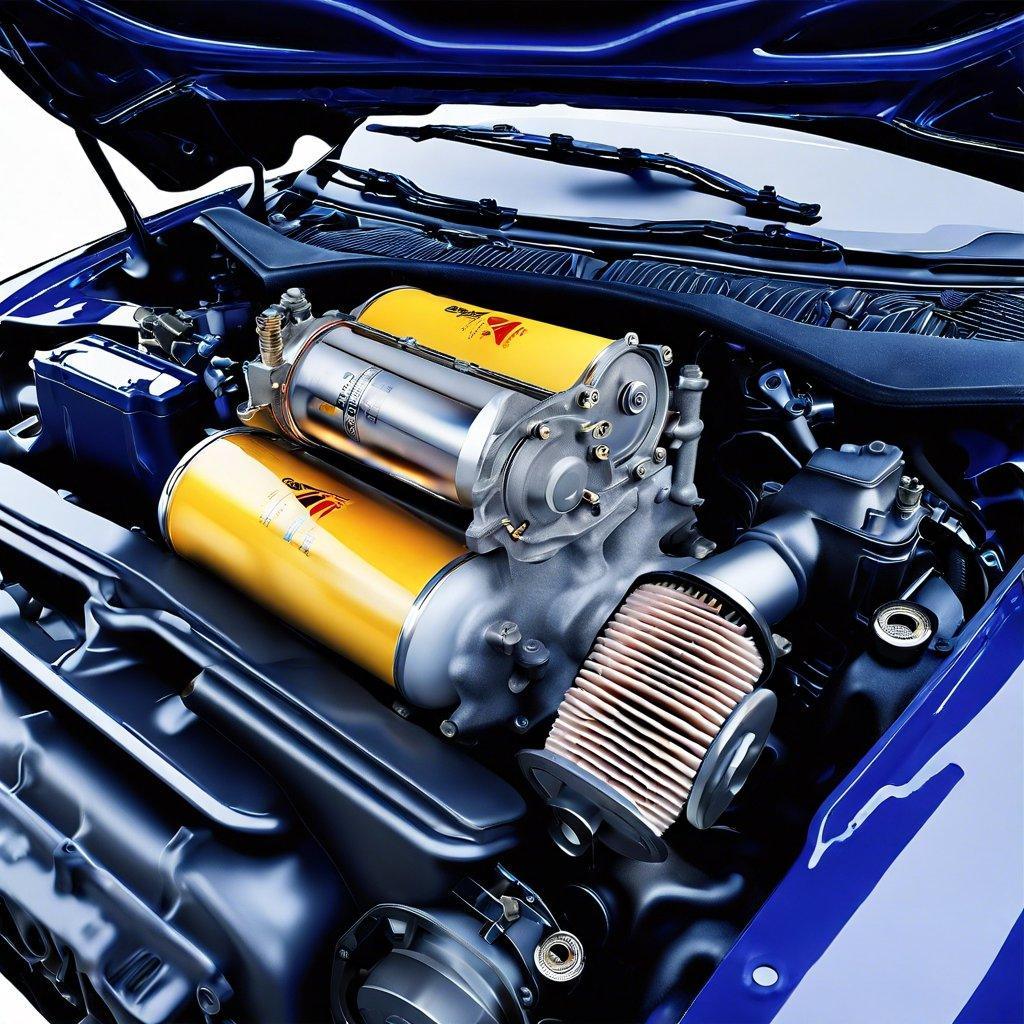Is Your Fuel Filter Bad? Diagnosis Tips
Pinpointing Fuel Filter Failure: Recognizing the Telltale Signs

Identifying Fuel Filter Failure
The fuel filter plays a crucial role in maintaining the integrity of your vehicle’s fuel system. Over time, this essential component can become clogged or damaged, leading to a range of performance issues. Recognizing the signs of a failing fuel filter is crucial for ensuring optimal engine operation and preventing more extensive damage.
Decreased Fuel Efficiency
One of the primary indicators of a bad fuel filter is a noticeable drop in fuel efficiency. As the filter becomes obstructed, it restricts the flow of fuel, forcing the engine to work harder to maintain the same level of performance. This increased strain on the engine can result in decreased miles per gallon (MPG), which can be a telltale sign that the fuel filter needs to be replaced.
Engine Hesitation and Stalling
A clogged fuel filter can also cause the engine to hesitate or stall, particularly during acceleration or when the vehicle is under load. This is because the restricted fuel flow makes it difficult for the engine to receive the necessary amount of fuel, leading to intermittent power delivery and potential stalling.
Difficulty Starting the Engine
A bad fuel filter can also make it challenging to start the engine, especially if the filter is severely clogged. The engine may crank but fail to start, or it may start and then immediately stall, indicating that the fuel system is not receiving the appropriate amount of fuel.
Rough Idling and Misfiring
Another sign of a failing fuel filter is rough idling or engine misfiring. As the filter becomes more restrictive, the fuel delivery to the engine becomes uneven, leading to inconsistent combustion and a rough, unstable idle. This can also cause the engine to misfire, further contributing to performance issues.
Fuel Pressure Fluctuations
If you have access to a fuel pressure gauge, monitoring the fuel pressure can provide valuable insights into the condition of the fuel filter. A clogged filter will cause fluctuations in fuel pressure, as the engine struggles to maintain a consistent flow of fuel.
Preventive Maintenance
To avoid the problems associated with a failing fuel filter, it’s essential to follow the manufacturer’s recommended replacement schedule. Typically, fuel filters should be replaced every 30,000 to 50,000 miles, or as specified in the owner’s manual. Proactive maintenance can help ensure the longevity of your vehicle’s fuel system and prevent costly repairs down the line.
| Symptom | Potential Cause |
|---|---|
| Decreased Fuel Efficiency | Clogged Fuel Filter |
| Engine Hesitation and Stalling | Restricted Fuel Flow |
| Difficulty Starting the Engine | Severely Clogged Fuel Filter |
| Rough Idling and Misfiring | Uneven Fuel Delivery |
| Fuel Pressure Fluctuations | Clogged Fuel Filter |
Recognizing the signs of a failing fuel filter is crucial for maintaining the health and performance of your vehicle’s engine. By being vigilant and addressing any issues promptly, you can prevent more serious problems and ensure the longevity of your vehicle’s fuel system.
Fuel Filter Diagnostics: Uncovering the Underlying Causes of Poor Performance
Understanding the Role of the Fuel Filter
The fuel filter is a critical component in any vehicle’s fuel system, responsible for removing impurities and contaminants from the fuel before it reaches the engine. A clogged or malfunctioning fuel filter can lead to a range of performance issues, including reduced fuel efficiency, decreased power, and even engine damage.
Identifying the Symptoms of a Bad Fuel Filter
When the fuel filter is not functioning properly, it can manifest in various ways. Some common symptoms of a bad fuel filter include:
- Reduced Fuel Efficiency: A clogged fuel filter can restrict the flow of fuel, leading to decreased fuel efficiency and reduced engine performance.
- Difficulty Starting the Engine: A blocked fuel filter can prevent the engine from receiving the necessary fuel, making it difficult to start the vehicle.
- Decreased Engine Power: A malfunctioning fuel filter can cause the engine to struggle under load, resulting in a noticeable decrease in power and acceleration.
- Rough Idling or Stalling: A faulty fuel filter may cause the engine to idle roughly or stall, particularly at low speeds.
Diagnosing a Bad Fuel Filter
To diagnose a bad fuel filter, it’s essential to perform a thorough inspection and testing process. This may involve:
| Diagnostic Step | Description |
|---|---|
| Visual Inspection | Examine the fuel filter for signs of physical damage, such as cracks, leaks, or excessive dirt buildup. |
| Fuel Pressure Test | Use a fuel pressure gauge to measure the fuel pressure before and after the fuel filter. A significant drop in pressure may indicate a clogged filter. |
| Flow Test | Measure the fuel flow rate before and after the fuel filter to determine if the filter is restricting the fuel flow. |
Addressing a Bad Fuel Filter
If the diagnosis indicates a bad fuel filter, the recommended course of action is to replace the filter with a new, high-quality component. Neglecting to address a faulty fuel filter can lead to further damage to the fuel system and engine components, resulting in more costly repairs down the line.
To maintain the health of the fuel system and prevent the premature failure of the fuel filter, it’s essential to follow the manufacturer’s recommended maintenance schedule for fuel filter replacement. Regular fuel filter changes can help ensure optimal engine performance and fuel efficiency.
Optimizing Fuel Efficiency: The Critical Role of a Well-Functioning Fuel Filter
The Importance of a Well-Functioning Fuel Filter
In the world of engineering and technology, where efficiency is paramount, the role of a properly functioning fuel filter cannot be overstated. This unassuming component plays a crucial part in maintaining the performance and longevity of your vehicle’s engine, ultimately contributing to optimized fuel efficiency.
Understanding the Fuel Filter’s Function
The fuel filter is responsible for removing contaminants, such as dirt, rust, and other impurities, from the fuel before it reaches the engine. This is essential to prevent clogging of the fuel injectors, which can lead to reduced engine performance, decreased fuel economy, and even engine damage over time.
Signs of a Failing Fuel Filter
Recognizing the warning signs of a failing fuel filter is crucial for proactive maintenance and optimizing fuel efficiency. Some common indicators include:
- Reduced fuel economy
- Difficulty starting the engine
- Stalling or hesitation during acceleration
- Increased engine noise or vibration
Fuel Filter Replacement and Maintenance
Regularly replacing the fuel filter, as recommended by the vehicle manufacturer, is essential for maintaining optimal fuel efficiency. This simple preventive measure can help extend the life of your engine and ensure consistent performance.
| Fuel Filter Replacement Interval | Fuel Filter Maintenance Tips |
|---|---|
| Every 30,000 to 50,000 miles |
|
The fuel filter is a critical component in maintaining the efficiency and performance of your vehicle’s engine. By understanding its importance, recognizing the signs of a failing filter, and following proper maintenance guidelines, engineering and technology professionals can ensure their vehicles operate at peak fuel efficiency, ultimately contributing to cost savings and environmental sustainability.
Proactive Fuel Filter Maintenance: Safeguarding Your Engine’s Lifeblood
Understanding the Importance of Fuel Filters
The fuel filter is a crucial component in any vehicle, playing a vital role in maintaining the health and longevity of the engine. Its primary function is to remove impurities, contaminants, and debris from the fuel before it reaches the engine, ensuring a clean and consistent fuel supply. Neglecting fuel filter maintenance can lead to a host of issues, including reduced engine performance, decreased fuel efficiency, and even complete engine failure.
Recognizing the signs of a failing fuel filter is crucial for proactive maintenance. Some common indicators include:
- Decreased Fuel Efficiency: If your vehicle is experiencing a noticeable drop in fuel economy, it could be a sign that the fuel filter is clogged, forcing the engine to work harder to draw fuel.
- Reduced Engine Power: A clogged fuel filter can restrict the flow of fuel, leading to a loss of engine power and sluggish acceleration.
- Difficulty Starting: A severely restricted fuel filter can make it challenging for the engine to start, as it struggles to draw the necessary fuel.
- Misfiring or Stalling: A clogged fuel filter can cause the engine to misfire or stall, as it is unable to receive the proper fuel mixture.
Fuel Filter Replacement Intervals
To ensure optimal engine performance and prevent costly repairs, it is recommended to replace the fuel filter at the intervals specified by the vehicle manufacturer. This information can typically be found in the owner’s manual or by consulting a professional mechanic. While the recommended replacement interval may vary, a good rule of thumb is to replace the fuel filter every 30,000 to 50,000 miles, or as needed based on the vehicle’s operating conditions and mileage.
Proactive Maintenance Strategies
Implementing a proactive fuel filter maintenance strategy can help extend the lifespan of your engine and prevent unexpected breakdowns. Consider the following steps:
- Regular Inspections: Regularly inspect the fuel filter for signs of wear, damage, or clogging, and replace it as recommended by the manufacturer.
- Use High-Quality Fuel: Ensure that you are using fuel from reputable sources and avoid low-quality or contaminated fuel, as this can accelerate the buildup of debris in the fuel system.
- Maintain Fuel System Cleanliness: Consider using fuel system cleaners or additives to help remove deposits and keep the fuel system components in optimal condition.
The fuel filter plays a crucial role in the overall health and performance of your vehicle’s engine. By understanding the importance of fuel filter maintenance, recognizing the signs of a failing filter, and implementing proactive maintenance strategies, you can help safeguard your engine’s lifeblood and ensure long-term reliable performance.




Post Comment